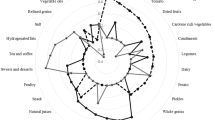Abstract
Objective: The aim of this study was to assess thrombosis tendency in subjects who were habitual meat-eaters compared with those who were habitual vegetarians.
Design: Cross-sectional comparision of habitual meat-eaters and habitual vegetarians.
Setting: Free living subjects.
Subjects: One hundred and thirty-nine healthy male subjects (vegans n=18, ovolacto vegetarians n=43, moderate-meat-eaters n=60 and high-meat-eaters n=18) aged 20–55 y who were recruited in Melbourne.
Outcome measures: Dietary intake was assessed using a semi-quantitative Food Frequency Questionnaire. The parameters of thrombosis were measured by standard methods.
Results: Saturated fat and cholesterol intakes were significantly higher and polyunsaturated fat (PUFA) was significantly lower in the meat-eaters compared with vegetarians. In the meat-eaters, the platelet phospholipids AA levels were significantly higher than in the vegetarians, but there was no increase in ex vivo platelet aggregation and plasma 11-dehydro thromboxane B2 levels. Vegetarians, especially the vegans, had a significantly increased mean collagen and ADP stimulated ex vivo whole blood platelet aggregation compared with meat-eaters. The vegan group had a significantly higher mean platelet volume than the other three dietary groups. However, meat-eaters had a significantly higher cluster of cardiovascular risk factors compared with vegetarians, including increased body mass index, waist to hip ratio, plasma total cholesterol (TC), triacylglycerol and LDL-C levels, ratio of TC/HDL-C and LDL-C/HDL-C and plasma factor VII activity.
Conclusions: Consumption of meat is not associated with an increased platelet aggregation compared with vegetarian subjects.
Sponsorship: Meat Research Corporation, Australia.
This is a preview of subscription content, access via your institution
Access options
Subscribe to this journal
Receive 12 print issues and online access
$259.00 per year
only $21.58 per issue
Buy this article
- Purchase on Springer Link
- Instant access to full article PDF
Prices may be subject to local taxes which are calculated during checkout
Similar content being viewed by others
Author information
Authors and Affiliations
Contributions
Guarantor: A Sinclair
Contributors: D Li, A Sinclair, N Mann, A Turner and M Ball initiated the study. D Li prepared the drafts of paper, did laboratory assays, collected data, and did the statistical analysis. A Sinclair selected the study site, supervised the project, and secured the funding. N Mann, F Kelly, L Abedin and A Wilson helped data collection and provided technical assistance. All investigators contributed to the drafts of paper.
Rights and permissions
About this article
Cite this article
Li, D., Sinclair, A., Mann, N. et al. The association of diet and thrombotic risk factors in healthy male vegetarians and meat-eaters. Eur J Clin Nutr 53, 612–619 (1999). https://doi.org/10.1038/sj.ejcn.1600817
Received:
Revised:
Accepted:
Published:
Issue Date:
DOI: https://doi.org/10.1038/sj.ejcn.1600817
Keywords
This article is cited by
-
A vegan diet improves insulin resistance in individuals with obesity: a systematic review and meta-analysis
Diabetology & Metabolic Syndrome (2022)
-
Exploratory serum fatty acid patterns associated with blood pressure in community-dwelling middle-aged and elderly Chinese
Lipids in Health and Disease (2016)
-
Prospective associations of meat consumption during childhood with measures of body composition during adolescence: results from the GINIplus and LISAplus birth cohorts
Nutrition Journal (2016)
-
Association of serum fatty acid and estimated desaturase activity with hypertension in middle-aged and elderly Chinese population
Scientific Reports (2016)
-
Diet as prophylaxis and treatment for venous thromboembolism?
Theoretical Biology and Medical Modelling (2010)


